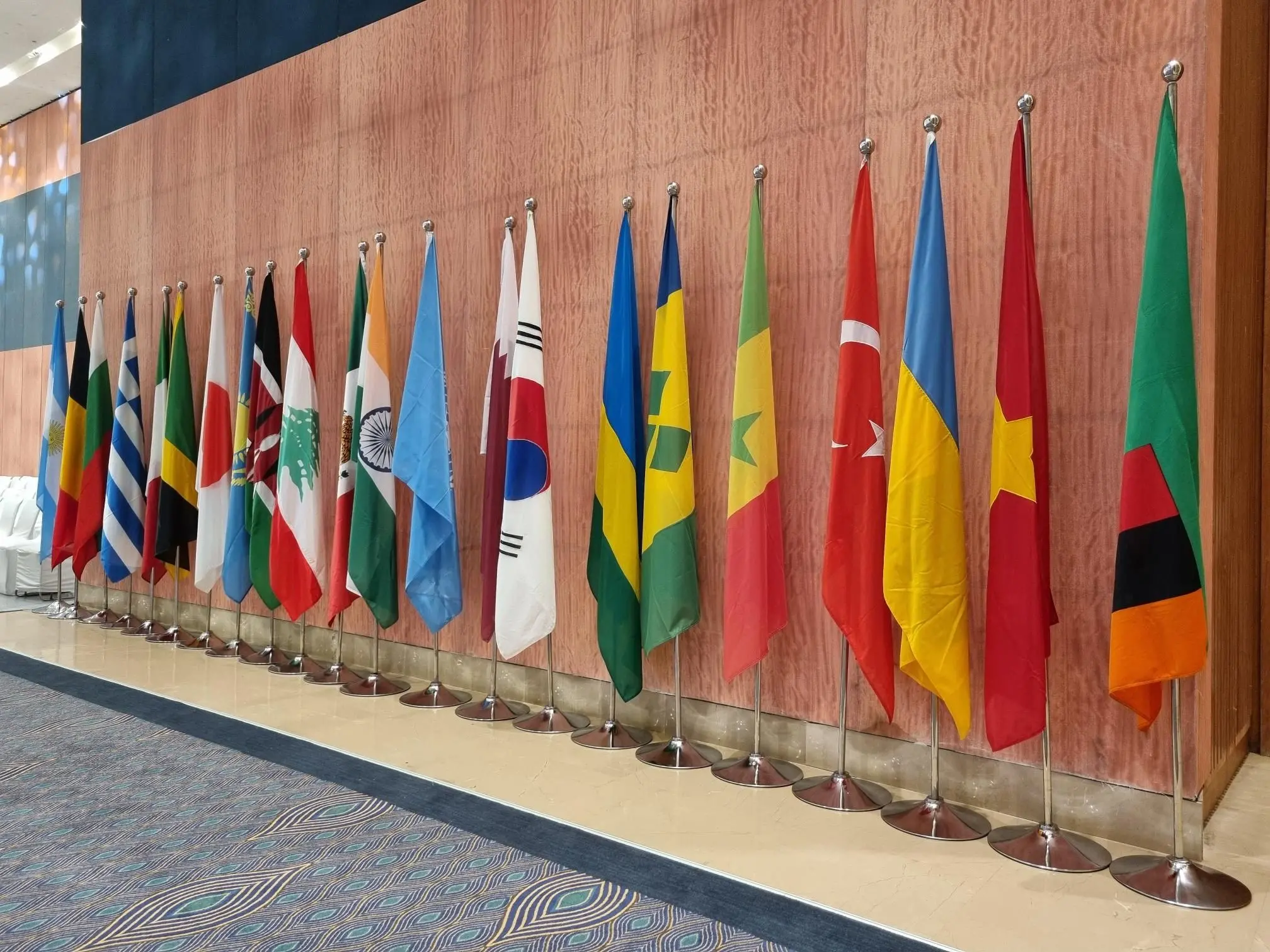46th session of the World Heritage Committee
The 46th session of the World Heritage Committee meeting opens today in New Delhi, India, where over the next 10 days, the Committee will decide which potential sites will be added onto the prestigious World Heritage List and take decisions on the conservation and management actions needed to protect World Heritage sites under threat.

46th session of the World Heritage Committee in New Delhi, India
Photo: IUCN
IUCN is the official advisor on nature to the World Heritage Committee, which is the governing body of the Convention and is made up of 21 of the Convention’s signatory States Parties, chaired this year by India. Over the past year, IUCN has undertaken extensive research and on the ground visits, to provide technical recommendations on the evaluation of potential new sites for inscription on the World Heritage List, and on the state of conservation of existing natural World Heritage sites including those on the List of World Heritage in Danger.
The livestream of the World Heritage Committee meeting is here: https://whc.unesco.org/en/sessions/46COM/.
All documents for the World Heritage Committee meeting are available at https://whc.unesco.org/en/sessions/46COM/documents/.
IUCN recommendations
- IUCN Evaluation report of new nominations (WHC/24/46.COM/INF.8B2 and WHC/24/46.COM/INF.8B2.Add)
- State of conservation reports for sites on the List of World Heritage in Danger (WHC/24/46.COM/7A, WHC/24/46.COM/7A.Add, WHC/24/46.COM/7A.Add.2, and WHC/24/46.COM/7A.Add.3)
- State of conservation reports for sites on the World Heritage List (WHC/24/46.COM/7B, WHC/24/46.COM/7B.Add, WHC/24/46.COM/7B.Add.2, WHC/24/46.COM/7B.Add.3, and WHC/24/46.COM/7B.Add.4)
State of conservation of sites on the List of World Heritage in Danger:
- Everglades National Park (United States of America)
- Río Plátano Biosphere Reserve (Honduras)
- Islands and Protected Areas of the Gulf of California (Mexico)
- Manovo-Gounda St. Floris National Park (Central African Republic)
- Mount Nimba Strict Nature Reserve (Côte d’Ivoire, Guinea)
- Garamba National Park (Democratic Republic of the Congo)
- Kahuzi-Biega National Park (Democratic Republic of the Congo)
- Okapi Wildlife Reserve (Democratic Republic of the Congo)
- Virunga National Park (Democratic Republic of the Congo)
- General Decision on the World Heritage properties in the Democratic Republic of the Congo
- Lake Turkana National Parks (Kenya)
- Rainforests of the Atsinanana (Madagascar)
- Aïr and Ténéré Natural Reserves (Niger)
- Niokolo-Koba National Park (Senegal)
- Selous Game Reserve (United Republic of Tanzania)
- Tropical Rainforest Heritage of Sumatra (Indonesia)
- East Rennell (Solomon Islands)
State of conservation of sites on the World Heritage List:
- Natural and Cultural Heritage of the Ohrid region (Albania, North Macedonia)
- Laponian Area (Sweden)
- Ancient Maya City and Protected Tropical Forests of Calakmul, Campeche (Mexico)
- Ennedi Massif: Natural and Cultural Landscape (Chad)
- Ngorongoro Conservation Area (United Republic of Tanzania)
- The Ahwar of Southern Iraq: Refuge of Biodiversity and the Relict Landscape of the Mesopotamian Cities (Iraq)
- Białowieża Forest (Belarus, Poland)
- Wadden Sea (Denmark, Germany Netherlands)
- Lake Baikal (Russian Federation)
- Volcanoes of Kamchatka (Russia Federation)
- Western Caucasus (Russian Federation)
- El Pinacate and Gran Desierto de Altar Biosphere Reserve (Mexico)
- W-Arly-Pendjari Complex (Benin, Burkina Faso, Niger)
- Ivindo National Park (Gabon)
- Djoudj National Bird Sanctuary (Senegal)
- Serengeti National Park (United Republic of Tanzania)
- Mosi-oa-Tunya / Victoria Falls (Zambia, Zimbabwe)
- Socotra Archipelago (Yemen)
- Great Barrier Reef (Australia)
- Manas Wildlife Sanctuary (India)
- Great Himalayan National Park Conservation Area (India)
- Lorentz National Park (Indonesia)
- Phoenix Islands Protected Area (Kiribati)
- Ha Long Bay - Cat Ba Archipelago (Viet Nam)
Selected Side Events
22 July (lunchtime) – ‘Everything you want to know about the Advisory Bodies’, co-organised by IUCN, ICOMOS and ICCROM.
22 July (evening) – ‘Contribution of the IUCN Green List to the effective management and equitable governance of World Heritage site’, organised by IUCN.
23 July (lunchtime) – ‘Climate Action Toolkit for World Heritage’, co-organised by ICCROM, Australia, IUCN, ICOMOS and the UNESCO World Heritage Centre.
23 July (evening) – ‘Monitoring climate impacts through citizen science environmental DNA’, organised by the UNESCO World Heritage Centre.
24 July (lunchtime) – ‘Discussion on participatory approaches to World Heritage’, organised by the Ministry of Foreign Affairs and the Korea Heritage Service of the Republic of Korea.
24 July (evening) – ‘Better management of our World Heritage – how to use the Enhancing our Heritage Toolkit 2.0’, co-organised by ICCROM, Swiss Federal Office for the Environment, IUCN, ICOMOS and the UNESCO World Heritage Centre.
24 July (evening) - 'World Heritage-related Category 2 Centres under the auspices of UNESCO: Prospects and Opportunities', organised by the Wildlife Institute of India - Category 2 Centre.
24 July (evening) – a side event co-organised by IIPFWH, UNESCO and Australia.
25 July (lunchtime) – ‘Integrating nature and culture in underwater cultural heritage’, organised by ICOMOS International Committee on Underwater Cultural Heritage (ICUCH).
26 July (evening) – ‘Enhancing World Heritage: exploring the potential of the Preliminary Assessment process for World Heritage nominations’, co-organised by IUCN, ICOMOS and the UNESCO World Heritage Centre.
27 July (lunchtime) - 'World Heritage, Biodiversity and Climate: mobilising action and finance', co-organised by UNESCO, Brazil and IUCN.
About IUCN and the World Heritage Convention
Since the inception of the World Heritage Convention in 1972, IUCN has played a unique role as the official advisory body under the World Heritage Convention on natural World Heritage. This involves leading the technical recommendation of all new nominations of natural and mixed World Heritage sites, monitoring the status of existing natural and mixed World Heritage sites and the newly added Preliminary Assessment process to provide direct advice on the feasibility of potential nominations to states parties.
IUCN also works independently on the Convention to support World Heritage sites globally though our extensive network of programs and policies led though our central Secretariat team, our expert commissions, and our member organisations.
Find out more about IUCN's work on World Heritage here and discover natural World Heritage sites here.
